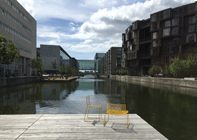Releasing the unexploited potential of the summer term
Leave the classroom, involve stakeholders and make new pedagogical experiments! These are a few of the guiding principles for the development of the new interdisciplinary summer courses at the University of Copenhagen, offered as part of the new “International Summer Programme”.
From small islands to common identity
Since the 1960s, summer courses have been organised at the University of Copenhagen  as separate entities at each faculty. In recent years, the development in numbers of summer courses has increased significantly and today, we offer more than 150 summer courses. Approximately 40 of these summer courses are targeting international students. However, the courses are spread out like small islands at the University with own administrative procedures making it challenging for international students to get a complete overview.
as separate entities at each faculty. In recent years, the development in numbers of summer courses has increased significantly and today, we offer more than 150 summer courses. Approximately 40 of these summer courses are targeting international students. However, the courses are spread out like small islands at the University with own administrative procedures making it challenging for international students to get a complete overview.
We made it simpler
Therefore in 2015 we launched an International Summer Programme, comprising all international summer courses relevant for international students. With a new centralised web page, it is now easy to find course descriptions, application procedures, housing options and other relevant information about our international summer courses.
Creating flagships
To boost the already existing selection of international summer courses, we are allocating funds for the development of new interdisciplinary summer courses. All courses are research-led, organized across faculties and will challenge the perceptions of the participants by looking at study areas from new perspectives. The development of courses is facilitated by International Education & Grants with Professor Flemming Konradsen as responsible for the selection of courses.
Flemming, who has organised summer courses for more than 10 years, believes that the summer period is often an overlooked and unexploited opportunity:
“The summer term is an excellent time to leave the classroom, involve stakeholders and try new pedagogical experiments.”
By saying so, Flemming is challenging his fellow professors to think outside the box if they expect to get funding for developing new flagships for the summer term.
Summer equals opportunities
With 14 new summer courses, we now offer a wide range of opportunities for the summer term. As an example you can study diplomacy at the Ministry of Foreign Affairs, debate humanitarian focus areas at different NGO’s or go to Sri Lanka for a field trip (see list in box). In January, you will be able to see a complete overview of the selection of summer courses that we offer in 2016.
At University of Copenhagen we will keep our strong focus on the summer term in the coming year by offering more summer courses for the international summer programme, enhancing international recruitment efforts and looking at possibilities of collaboration with partners.
For further information about our International Summer Programme go to the website or contact Thomas Grubach, Project Coordinator.
Interdisciplinary summer courses
Courses offered from 2014 and 2015
- Humanitarian action in the 21st century
- Economic diplomacy
- Mass Drug Administration
- Protein structure and dynamics
- Obesity in a cross-disciplinary perspective
- Roots of Europe
Courses offered from 2016
- Nutrition in Global Health
- Cross-disciplinary field course in Sri Lanka
- Innovation and Proactive Law
- Alive and KICking - Innovative solutions for aging related challenges
- Water and sanitation in emergencies
- Urban Life Across The Globe: Activism and Change in World Cities
- Science Communication in theory and practice
- New Wars & Old Beliefs: Conflict and Religion in 21st Century
Prof. Flemming Konradsen
 Flemming is the director of Copenhagen School of Global Health and has organised several summer courses for more than 10 years. He is the initiator of the summer project and responsible for selecting the courses that are subsidised for 3 years.
Flemming is the director of Copenhagen School of Global Health and has organised several summer courses for more than 10 years. He is the initiator of the summer project and responsible for selecting the courses that are subsidised for 3 years.
